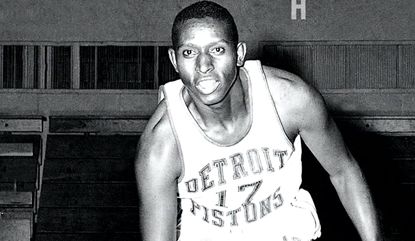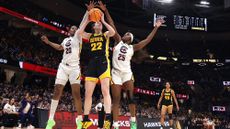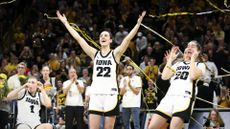Earl Lloyd, the first black NBA player, is dead at 86


In 1950, Earl Lloyd became the first African-American to play in the NBA, making his debut with the Washington Capitols before going on to play with the Syracuse Nationals and Detroit Pistons. He won a championship with the Nationals, then became one of the NBA's first black coaches. Lloyd died on Thursday at age 86.
Lloyd said that his first pro appearance on the court — in Rochester, New York, on Oct. 31, 1950 — was pretty low-key, Kenneth Shouler writes at ESPN. "I stepped onto the court and the world kept spinning," Lloyd said. "No one said a word — not the fans, players, anybody. Nothing was ever said about me being the first black. They acted as if I was a player, period." That same season, Charles Cooper and Nat "Sweetwater" Clifton also made their NBA debuts.
Even if he was nonchalant about integrating the NBA, other players hold him up as a pioneer. Below, you can watch Shaquille O'Neal and Charles Barkely talk about what Lloyd meant to them, during a break in Thursday night's Oklahoma City-Phoenix game. —Peter Weber
Subscribe to The Week
Escape your echo chamber. Get the facts behind the news, plus analysis from multiple perspectives.

Sign up for The Week's Free Newsletters
From our morning news briefing to a weekly Good News Newsletter, get the best of The Week delivered directly to your inbox.
From our morning news briefing to a weekly Good News Newsletter, get the best of The Week delivered directly to your inbox.
Create an account with the same email registered to your subscription to unlock access.
Sign up for Today's Best Articles in your inbox
A free daily email with the biggest news stories of the day – and the best features from TheWeek.com
Peter has worked as a news and culture writer and editor at The Week since the site's launch in 2008. He covers politics, world affairs, religion and cultural currents. His journalism career began as a copy editor at a financial newswire and has included editorial positions at The New York Times Magazine, Facts on File, and Oregon State University.
-
 What to know when planning an awe-inspiring hike on the Inca Trail
What to know when planning an awe-inspiring hike on the Inca TrailThe Week Recommends Peru's most famous trail leads to Machu Picchu
By Catherine Garcia, The Week US Published
-
 Lead poisoning remains a threat
Lead poisoning remains a threatThe Explainer The toxin is built into our lives
By Devika Rao, The Week US Published
-
 Should you use a 529 plan? What to know about this college savings option.
Should you use a 529 plan? What to know about this college savings option.The Explainer This tax-advantaged savings account can be used to pay tuition or buy textbooks
By Becca Stanek, The Week US Published
-
 Caitlin Clark the No. 1 pick in bullish WNBA Draft
Caitlin Clark the No. 1 pick in bullish WNBA DraftSpeed Read As expected, she went to the Indiana Fever
By Peter Weber, The Week US Published
-
 South Carolina ends perfect season with NCAA title
South Carolina ends perfect season with NCAA titleSpeed Read The women's basketball team won a victory over superstar Caitlin Clark's Iowa Hawkeyes
By Rafi Schwartz, The Week US Published
-
 Iowa's Caitlin Clark breaks NCAA scoring record
Iowa's Caitlin Clark breaks NCAA scoring recordspeed read College basketball star Caitlin Clark set the new record in Iowa's defeat of Ohio State
By Peter Weber, The Week US Published
-
 Eight-year-old Brit Bodhana Sivanandan makes chess history
Eight-year-old Brit Bodhana Sivanandan makes chess historySpeed Read Sivanandan has been described as a 'phenomenon' by chess masters
By Sorcha Bradley, The Week UK Published
-
 Watch Simone Biles win her record 8th US gymnastics championship
Watch Simone Biles win her record 8th US gymnastics championshipSpeed Read
By Peter Weber Published
-
 Spain beats England 1-0 to win its first Women's World Cup
Spain beats England 1-0 to win its first Women's World CupSpeed Read
By Justin Klawans Published
-
 US knocked out of Women's World Cup in stunning exit
US knocked out of Women's World Cup in stunning exitSpeed Read
By Justin Klawans Published
-
 Katie Ledecky surpasses Michael Phelps for most world championship titles
Katie Ledecky surpasses Michael Phelps for most world championship titlesSpeed Read
By Justin Klawans Published